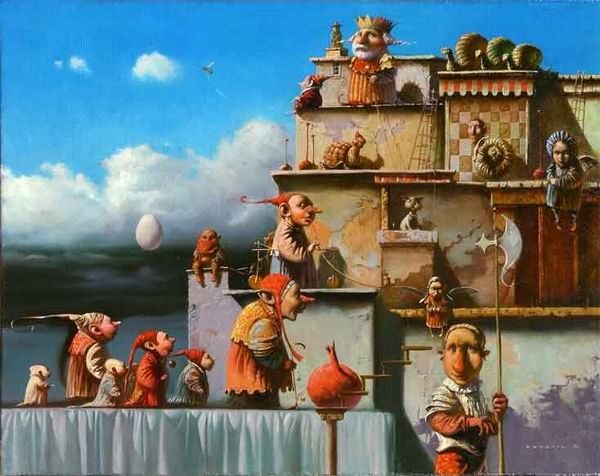
How Rating is Ruining Chess
THE RISE OF THE QUANTS = Decline in Original Ideas and Creativity.
The mainstream media and chess public are endlessly fascinated by the World #1, Magnus Carlsen of Norway.
Yes, he is the reigning World champion with the highest rating anyone has ever achieved. In this number-obsessed world it is something almost everybody is deeply bowing to.
In a Financial Times article a few years ago, Judit Polgar, widely considered the strongest female chess player of all time, put it, with burning enthusiasm, this way, “What is frightening is to see him close to 2,900 points. I think he can play much better.”
Carlsen’s tournament results are also spectacularly impressive. It is something that can be quantified and most people highly respect and revere.
Everything is a Number
The above line was the central belief of the ancient Greek mathematician Pythagoras some twenty-five centuries ago.
It is still very much on.
This is time of the Rise of the Quants — that is, the ascent to power of a monstrous system across fields and institutions that is seeing everything through numbers, metrics, algorithms and automated decision-making processes rather than old traditional thinking, human judgment and intuitive abilities.
“The reason the Quants win, is that they’re almost always right—at least at first. They find numerical patterns or invent ingenious algorithms that increase profits or solve problems in ways that no amount of subjective experience can match. But what happens after the Quants win is not always the data-driven paradise that they and their boosters expected. The more a field is run by a system, the more that system creates incentives for everyone (employees, customers, competitors[, chess players]) to change their behavior in perverse ways—providing more of whatever the system is designed to measure and produce, whether that actually creates any value or not. It’s a problem that can’t be solved until the Quants learn a little bit from the old-fashioned ways of thinking they’ve displaced,” Felix Salmon, Why Quants don’t know everything, Wired Magazine.
Campbell’s Law
Sociologist Donald T. Campbell articulated it in what’s come to be known as Campbell’s law, “The more any quantitative indicator is used for decision-making, the more subject it will be to corruption pressures and the more apt it will be to distort and corrupt the processes it is intended to monitor.”
So what is corrupted and distorted in chess, one may ask, when we use the ELO rating system? Well, the first victims are originality, fantasy, in fact everything that may link chess to any artistic expression. Who wants to risk it and lose points?
Salmon continues, “once empowered, Quants tend to create systems that favor something pretty close to cheating.” That is exactly what we see in modern chess, with the rating system in place we are cheating creative imagination and inspiration. But not only that, tournament results are being literally cheated as some players are looking for dishonest ways to “outplay” the opponent with “creative use” of digital helpers (as you see, not really sought over the board is creativity itself).
The victim of Quants is not only chess. Take any domain. How about music industry?[1]
Why is Pop Music so Repetitive?
You downloaded a song, or googled for a band, “recording companies track your activity and use big-data stats to predict which new songs will be hits. Relying on wisdom of the crowd may actually lead to a ‘clustering’ of styles and a dispiriting sameness in all music genres, producing worse music in the end.”
“This all may be good for business and profits, but not so good for music.” Derek Thompson, The Shazam effect, The Atlantic Magazine.
Chess, Same Tune Again
Now compare with chess and how chess stats (rating) has brought the quality of chess down; creativity and originality are also down; games are so repetitive; and players styles have been leveled down too (ultimately converging to the computer-like style of the current World #1).
That is all good for business and profits, but not so for chess. All good for Judit Polgar and other protectors and beneficiaries of the system that favors number$ rather than intangible act of creation and inspiration. Her “Carlsen can play much better” means, of course, Carlsen’s 2900+ rating, not more beautiful games of the champion that would inspire us, the fans.
“This obsession with mathematics is an easy way of acquiring the appearance of scientificity without having to answer the far more complex questions posed by the world we live in.” –Thomas Piketty, Capital in the Twenty-First Century
So should we exclusively use Carlsen’s rating to properly assess his true contribution to the game of chess? Should we really measure everything and everyone only against the numbers? While everything else seems just to be noise.
You judge for yourself. Not so numerically intensive, if you will…
NOTE:
1. There are so many distortions when we think only-numbers. Salmon mentioned some in his article:
“Policing is a good example, as explained by Harvard sociologist Peter Moskos in his book Cop in the Hood: My Year Policing Baltimore’s Eastern District. Most cops have a pretty good idea of what they should be doing, if their goal is public safety: reducing crime, locking up kingpins, confiscating drugs. It involves foot patrols, deep investigations, and building good relations with the community. But under statistically driven regimes, individual officers have almost no incentive to actually do that stuff. Instead, they’re all too often judged on results—specifically, arrests.”
“The same goes for the rise of ‘teaching to the test’ in public schools,” and so on, and on…
In the Wall Street Journal’s We are all Quants now article, Paula Marantz gives a story from a friend of hers babysitting a 7-year old girl:
“That’s good work,” said my friend in encouraging fashion. “Are you proud of it?”
“I’m not sure,” said the little girl, “I’ll bring it to school and see how many ‘likes’ I get.”
